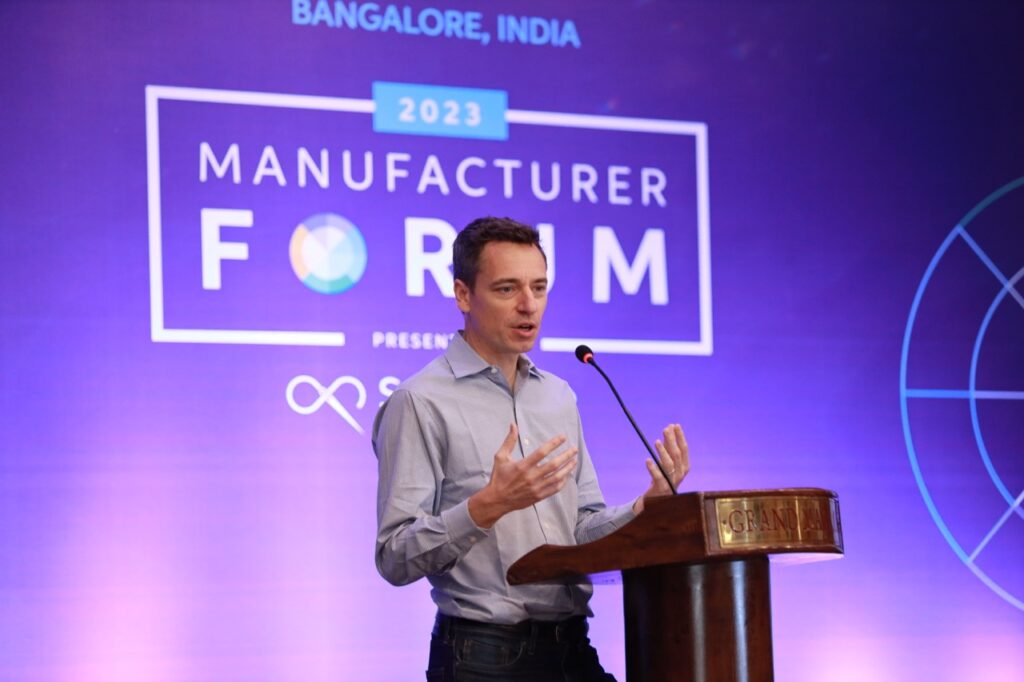
Dear Fashion: Let’s Step Up and Get Aligned
In a recent opinion editorial with WWD, CEO Colin Browne argues fashion needs to take more serious and coordinated action on sustainability. Read the highlights here!


The Sustainable Fashion Forum 2024 took place April 17 to 19 in Austin, Texas, convening a number of sustainable fashion professionals.
Topics spanned everything from labor rights to regulatory changes. The event began with workshops on policy and circularity, including an immersive upcycling activity featuring Cascale members Everlane and Eastman, as well as two full days of programming. Networking opportunities were plentiful, hosted at venues throughout the city.
Cascale’s editorial director Kaley Roshitsh and Melissa Ortuño de León, senior manager, Higg Product Tools, both participated in the event and moderated conversations.
In one conversation, “Achieving Profitability as a Small Brand,” Jan Lo, co-founder and chief executive officer at Lo&Sons spoke of the trade-offs of owning a small business. He detailed the aims of his growing business which includes strategic decision-making across his value chain, be it recycled materials or flat-packing products.
The co-founder also treated the audience to samples of Lo&Sons’ “Catalina Deluxe” tote made of recycled polyester, with utility uniquely inspired by his former New York City DJ career.
Lo is also on the board of Yale University’s Center for Business and the Environment, offering support to entrepreneurs. His advice to early-career professionals is to be willing to pursue the “not-so-glamorous job title,” often found in supply chain or operations roles.
In another panel conversation titled “Who’s at the Table: Embracing Global Voices in Fashion’s Circular Future,” experts Charles Oyamo, co-founder and CEO, Rethread Africa; Yayra Agbofah, founder at The Revival and consultancy AfroDistrict; and Sandra Gonza, senior sustainability strategist, Quantis International; traced the arc of circularity.
The panelists discussed the urgency to fundamentally transform the existing fashion system and embrace circularity while calling for major funding inroads to support their work. A former clothing market trader in Ghana’s Kantamanto Market, Agbofah shared how his community-led initiative The Revival is turning consumer textile waste exported into West Africa – into art. Meanwhile, Oyamo spoke of the reality of scaling his agrowaste fiber. Throughout the conversation, Gonza offered her strategic perspective including how she is working with brands to develop transformational sustainability programs.
In another panel conversation, Sanchita Saxena, senior advisor of supply chain at Article One, and Sheela Ahluwalia, director of policy and advocacy at Transparentem, spoke of the audit-dodging practices that persist in the apparel and textile industry.
“Many suppliers are saying, ‘I don’t think it’s ever possible there’s a true partnerships… We have to think of beyond just doing the minimum,” said Saxena, calling for the reframing of “rightsholders over stakeholders.”
In a separate policy presentation, Michelle Gabriel, graduate program director of sustainable fashion at Glasgow Caledonian College New York City said being a consumer is a “disempowered identity,” arguing for a citizen-first approach. She championed regulatory changes adding, “Businesses today face a competitive disadvantage for engaging in sustainability.”
In March, Cascale and Worldly held a webinar, “Navigating Legislation & the Higg Index: Higg Product Tools with PEF and more.” In this blog, we share the recording, highlight key takeaways, and address submitted questions during the session.

Key Takeaways
“The PEF methodology is likely to play an important role in the future EU product and consumer law legislation. The Higg Product Tools methodology is well-positioned for alignment with Product Environmental Footprint (PEF)/PEF Category Rules (PEFCR), and the Higg Product Tools can support members in navigating evolving legislations and provide guidance in their compliance journeys.” –Elisabeth von Reitzenstein, senior director of policy and public affairs
“France has been, and probably will be for the foreseeable future, a frontrunner on sustainability legislation….The French label is based on a type of PEF. It has very strong alignment with the European Product Environmental Footprint principles. One difference on durability is that the French Methodology also includes ‘emotional durability’ to a more committed extent than the European one. This proves again that a common method on PEF is important…Another new French initiative is a draft bill targeting fast fashion and sometimes ultra-fast fashion… Also on the European level, France is fighting its corner on these issues. At a Council of the EU meeting on March 25, it called, alongside Sweden and Denmark, for an EU-wide export ban of hazardous textile waste to developing countries.” – Elisabeth von Reitzenstein, senior director of policy and public affairs
“Through our partnership with Cascale, Worldly is paying close attention to this regulatory landscape and what our customers need in order to prepare and report on their sustainability performance and progress. My team meets at minimum weekly with Cascale to get deep into the weeds on PEF, how it’s evolving, and what it means for our tools and the solutions we’re delivering. The Cascale team also helps us understand the challenges the industry is facing firsthand and ways to address it in the tools. Data is going to play a critical role in many, if not all, of these reporting requirements.” – Paula Bernstein, senior data manager, Worldly
“The concept of accessibility is really key for the Product Tools because we want a variety of users with different levels of LCA knowledge, as well as data availability to produce consistent environmental product footprint results.” – Quinten Geleijnse, manager, Higg Product Tools and lifecycle assessments
“Like the rest of the Higg Index Tools, we don’t want the sole purpose of the tools to be compliance – the tools should be going beyond regulation. We’re not just trying to have a PEF-compliant calculator. That is not ambitious enough to get the industry on track to where it needs to be. [The Higg Index] needs to be aligned with PEF, at minimum for compliance, but we do need to go beyond that.” – Joel Mertens, director, Higg Product Tools
“There are a lot of commonalities between Higg Index Product Tools, PEF, and France’s Ademe methodology but we do expect that even with the same product information, it is very likely you will have different results depending on which methodology you’re calculating to or which region you’re calculating to…One of the important things is while there are differences in the results, the impact categories, the data needs, there is a way to bring this all together, and that is the hub concept.” – Mertens
“One of the key aspects here is the difference between a footprint calculation and a footprint study, or LCA study. Our tools are calculating an environmental footprint of a product. An LCA study is distinct from the footprint calculation. There are additional requirements that have to be done to take you to that full study level, including a report and verification.” – Mertens
“PEF is an implementation of ISO-1440 and 44 standards. There are study requirements associated with that that I think get lost in the narrative. As to other tools in this space, the one thing I will say right now is there is not a final PEFCR for apparel and footwear. There are a lot of claims and misunderstandings as to what you can say in terms of compliance to PEF and PEFCR, and there’s no such thing at this point.” – Mertens
Questions Answered
On the webinar, speakers discussed relevant EU legislation and initiatives, including:
These regulations relate in different ways to the Product Environmental Footprint (PEF) method and product footprinting in general. CSRD requires a thorough assessment of an organization’s impacts, risks, and opportunities, and specifically mentions PEF as a way to assess these. In addition, the calculation of scope 3 emissions is required under ESRS E1, for which LCAs and/or PEF studies are useful. ESPR will likely require environmental impacts to be communicated to external stakeholders through the Digital Product Passport, for which PEF and LCA studies can be used. The European Commission proposal for the SGCD sees a more diminished role for PEF in its current form than initially foreseen. Although PEF might not become a mandatory requirement itself under SGCD, the more simplified procedure now pursued may include a presumption of conformity for environmental claims that are based on recognized methods, such as PEF. The French labeling law is based on calculations obtained from a central database run by Ecobalyse and the Agency for Ecological Transition (ADEME). This method is inspired by PEF but has some noticeable differences.
The PEF category rules (PEFCR) contain specific rules for product categories that complement the PEF methodology. The rules direct focus to the parameters relevant to that specific product group, further standardizing the methodology. The Technical Secretariats (TS) of the EU develop these PEFCRs, and Cascale coordinates the TS developing the PEFCR for Apparel & Footwear, which includes determining the product-specific methodology and primary data requirements. The TS does not determine what secondary datasets are to be used and has to stay in line with the general PEF methodology. The PEFCR is expected to be finalized in Q1 of 2025 and is currently in its consultation phase.
The Higg Product Tools aim to guide product eco-design decisions by providing reliable, high-quality data. Given the legislative developments and the changing data requirements that they cause, the Product Tools should evolve accordingly. Our objective is to develop the Product Tools as a hub that allows different users (with different levels of data availability and LCA knowledge) to compute different types of results for different purposes. This means users can continue to identify impact hotspots and calculate scope 3 emissions, while we expand the tools’ functionalities to allow for PEF calculations. It is important to note that PEF compliance entails more than calculations only as PEF requires an extensive study report that has to be verified by a third party.
Some steps towards PEF-aligned calculations have already been taken by Cascale and Worldly. The current Product Module methodology was developed in alignment with the 2021 version of the PEFCR. This means the Product Tools are already well set up to expand towards PEF-aligned calculations. The team has mapped the key remaining differences between the current Product Tools methodology and emerging regulatory frameworks. This exercise informs Cascale’s product information Member Expert Team (MET) that currently helps define the product-relevant information fields the Product Tools need to contain to align with the data requirements of various frameworks, including PEF, ADEME, and the DPP. As indicated by the workstream flow chart below, Cascale will begin integrating the ADEME and PEF calculation methodologies with the Product Tools when they are finalized. In the meantime, work with the Product Information and Product Impact MET and continue to develop the tools’ hub functionality.

Cascale is working with Wordly to create a harmonized set of information fields for the Product Tools, containing all required information from the different legislative frameworks and distinguishing between mandatory, recommended, and optional data points. This allows users to compute different types of results based on a single set of information and enables the provision of at least some results when limited data is available. Cascale will also expand its current list of five impact categories to the 16 impact categories specified in the PEF methodology. To enable different result types to be computed, different calculation methodologies will have to be integrated into the Product Tools, some of which rely on different datasets than those currently used in the tools. Cascale is working together with Wordly to allow for parallel impact calculations and add these new (EF) datasets to the tools.
Please note that the visual is taken from the webinar slide deck and the timeline reflects the March 27, 2024 webinar date. Depending on when you are viewing this blog post, the visual may be out of date.
Cascale and Worldly are working together to expand the Product Tools to enable users to select the energy mix used to manufacture their products. This will ensure the country or facility-specific energy mix is considered in the calculations, providing more precise impact calculations. A next step will be to connect the Higg Product Tools with the Higg Facility Environmental Module (FEM) to enable the sharing of facility data to be used for product impact calculations.
While many of our members can and are already using the product tools for homeware and home textiles, PEF currently is explicit for “Apparel and Footwear.” The sectors the EU Commission has identified for PEF are the following:
However, the Product Tools may still be used to assess adjacent products such as home textiles. Even our current Product Module tool has an option for an “other” product category, which is being used by some members to assess these types of products.
If you have any remaining questions, we invite you to email us at marcomm@cascale.org.


In the world of physics, few names carry as much weight as Peter Higgs.
Yet, it’s in the realm of sustainability where his legacy finds a surprising homage. Higgs, who died Tuesday at age 94 in Edinburgh, Scotland, received the Nobel prize for physics in 2013 for his work on the boson particle.
The Higgs boson particle would forever shape humanity’s understanding of atoms – and at Cascale, it served as inspiration for the Higg Index tools. Today, these tools are used by 24,000 businesses worldwide, empowering collaboration to drive equitable and restorative business practices in the consumer goods industry.
At Cascale’s recent rebrand celebratory event in London, co-founder Rick Ridgeway shared the story of how Higgs’ breakthrough announcement impacted the organization’s earliest days. “They had just discovered a subatomic particle [that] was going to unify the universe, Ridgeway said. “They were going to announce it about the same time we wanted to release our tool…I said, ‘If the Higgs boson atomic particle is going to unify the universe, the Higg assessment tool is going to save it.’”
Much of Higgs’ lifetime of work took place at Edinburgh University, and, in 2012, the institution set up the Higgs Centre for Theoretical Physics in his honor – the same year his theory was accepted and proven by scientists at The Large Hadron Collider at Cern in Switzerland. Decades of collaboration also went into the discovery: Higgs shared the Nobel prize with Belgian theoretical physicist François Englert, whose work directly contributed to the particle’s discovery.
Higgs’ legacy continues to inspire, as use of the Higg Index tools expands across the consumer goods industry, accelerating adoption of science-aligned targets through the Decarbonization, Manufacturer Climate Action Programs (MCAP), and other impact programs. This example is just one of the many synergies between industry and science in pursuit of a better planet.
Webinar series will help prepare Cascale members and users of the Higg Index tools for compliance with current and emerging legislation impacting the global consumer goods industry.

Cascale, the global nonprofit alliance formerly known as the Sustainable Apparel Coalition, is set to launch a crucial webinar series in 2024.
Designed to navigate the complex regulatory landscape, this series will guide over 24,000 Higg Index users through compliance with current and upcoming EU and national legislation. This effort underscores Cascale’s commitment to equipping the consumer goods industry with the tools necessary for sustainability performance improvement amidst evolving regulations.
“The recently adopted Corporate Sustainability Due Diligence Directive by the Council of the EU underscores the importance of companies understanding the impact of new pieces of legislation and how tools like the Higg Index can support their compliance journey and due diligence process,” said Elisabeth von Reitzenstein, senior director, public affairs at Cascale. “We are proud of the work that goes into updating the Higg Index suite of tools to align with relevant existing and upcoming legislation that will help shift the consumer goods industry to one that gives back more than it takes to people and the planet.”
The “Navigating Legislation & the Higg Index” webinar series kicks off on March 27 with an inaugural webinar on how the Higg Product Tools intersect with key legislation such as Product Environmental Footprint (PEF), Ecodesign for Sustainable Products Regulation (ESPR), and Substantiating Green Claims Directive (SGCD). This webinar is open to all and attendees will receive summary materials; please click here to register.
Future sessions will explore how the Higg BRM tool complements legislation such as the European Union’s Corporate Sustainability Reporting Directive (CSRD), which entered into force in January 2023, as well as how the Higg Facility Tools align with relevant legislation like CSRD and the Corporate Sustainability Due Diligence Directive (CS3D), a European directive that is expected to be finalized in the upcoming weeks and will require due diligence for companies to prevent adverse social and environmental impacts across their value chains. The discussions will continue at Cascale events throughout the year; please click here to receive more information.
Cascale serves as a catalyst for standardized sustainability performance measurement across the consumer goods industry. Recognizing the evolving regulatory landscape, the organization initiated comprehensive analyses to map the Higg Index suite of tools with relevant existing and upcoming EU and national legislation. These analyses form the basis of the “Navigating Legislation & the Higg Index” webinar series and accompanying resources and, by identifying existing and future gaps, help inform the continuous evolution of the tools alongside regulatory changes to facilitate proactive alignment. In November 2023, Cascale published a summary report outlining the key insights gleaned from these analyses. By advocating for the tools’ continued relevance, Cascale empowers its members to navigate complex regulatory requirements with confidence.
In tandem with the webinar series, Cascale will provide its members with updates and resources to help them navigate the regulatory landscape, emphasizing how the Higg Index aligns with their legislative obligations and due diligence requirements. Click here to learn more about becoming a member.
CASCALE AND THE HIGG INDEX
Cascale’s Higg Index suite of tools is comprised of five modules: the Higg Facility Environmental Module (FEM), Higg Facility Social & Labor Module (FSLM), Higg Brand & Retail Module (BRM), Higg Materials Sustainability Index (MSI), and Higg Product Module (PM). These tools are designed to enhance standardized sustainability practices and performance for the consumer goods industry; in many cases, the tools can also support compliance and legislative requirements.
CASCALE AND PEF/PEFCR/CSRD
Cascale actively advocates and collaborates with policymakers, which includes facilitating the Product Environmental Footprint (PEF) Technical Secretariat for Textiles and Footwear and providing technical expertise for drafting the sector-specific methodology for the textile sector (i.e. the PEFCR). Cascale’s Higg BRM team will provide technical expertise to EFRAG, a coalition funded by the European Commission, to draft the Corporate Sustainability Reporting Directive (CSRD) sector-specific data points for the textile sector.
ABOUT CASCALE
Cascale is the global nonprofit alliance catalyzing collective action toward equitable and restorative business practices in the consumer goods industry. Spanning 300 retailers, brands, manufacturers, governments, academics, industry associations, and nonprofits across 37 countries, we are united by a singular vision to give back more than we take for people and the planet. Cascale’s membership includes apparel, footwear, home furnishings, sporting and outdoor goods, and bags and luggage companies.
Formerly known as the Sustainable Apparel Coalition, Cascale owns and develops the Higg Index. Initially formed to create standardized sustainability metrics, Cascale has sharpened its focus to driving pre-competitive collective action for a unified industry transformation. As an independent entity, Cascale brings together brands, retailers, manufacturers, NGOs, academics, and industry associations to combat climate change, ensure decent work, and contribute to a nature-positive future.


With 2030 on the horizon and regulation in flux, brands and retailers are looking for a streamlined means for measuring progress.
In an interview with Cascale, Maravillas Rodriguez Zarco, senior director Higg Index Strategy & Operations, explored the recent Higg Brand and Retailer Module (BRM) update, including how it could advance data-driven decision-making and compliance in fashion.
Zarco shared that, for starters, Higg BRM’s ESG assessment is designed specifically for fashion’s hotspots so any brand or retailer can isolate and deploy resources more effectively. Amid ongoing regulation, the Higg BRM will support users in their compliance journey, specifically with the European Union’s Corporate Sustainability Reporting Directive (CSRD). The Higg BRM, as with other tools, was the subject of a November 2023 policy alignment report from Cascale and consulting firm BCW. The analysis showed Higg BRM is “well aligned” with the requirements of the EU CSRD.
“Our strength lies in understanding the dynamics occurring throughout the value chain, knowing where to put the effort and what the immediate challenges of the industry are to become more sustainable,” said Zarco.
Higg BRM provides granular data in a digestible way that allows for data-driven decision-making. Zarco said it’s a testament of the way the assessment was built and how the scoring was developed. Benchmarking (a members-only feature) and verification equally supports this intention. Ultimately, the tool allows fashion brands and retailers to assess and support their partners along their compliance journey.
“We think of Higg BRM not only as a robust ESG assessment tool, but also an ally for members and non-members alike. It allows fashion brand and retailers to assess their ESG performance in a standardized way. It can be shared with their business partners across the value chain, so that they can make informed decisions.”
And policy is not ever an afterthought. Zarco said a technical paper is coming soon, outlining the specifics of brand and retailer compliance. Until then, she said the latest Higg BRM update is a useful way to drive data-driven decision-making for brands.
“We’re actively evolving the tool to address potential gaps between the Higg BRM and the CSRD,” said Zarco. “Through this tool, brands and retailers are able to build consistent corporate sustainability strategies to deliver more effectively on ESG goals and industry needs, reduce reporting burden, and avoid duplication across sustainability initiatives.”
Specifically, the updates include improved data consistency and accuracy, while providing deeper performance metrics and insights. Another standout feature of the update, Zarco mentioned, is upgraded benchmarking for members. All past versions of Higg BRM are compatible with upcoming versions including this latest update. Further, the tool maintains alignment with key industry frameworks including Textile Exchange’s Material Benchmark, which addresses more sustainable or preferred fiber types, and the Zero Discharge Hazardous Chemical (ZDHC) “Brands to Zero” program which focuses on net-zero improvements.
Cascale also updated its Higg BRM Verification upon member feedback for improved consistency and data accuracy. Exactly 11 brands participated in the Higg BRM verification pilot and their insights informed the latest updated Higg BRM Verification. This version is available to all users but remains optional for Cascale members.
“Though a minor update, the latest Higg BRM is designed for major impact,” she reiterated.

Amsterdam, Hong Kong, Oakland (CA) – March 4, 2024: Cascale (formerly the Sustainable Apparel Coalition) has launched the latest version of the Higg Brand and Retail Module (BRM), part of the Higg Index suite of tools. This update reflects Cascale’s commitment to continuously evolving, updating, and refining the Higg Index to meet the needs of members, users, and the industry.
The Higg BRM is the leading framework specific to the textile, apparel, and footwear industry designed for brands and retailers to evaluate, assess, and improve Environmental, Social, and Governance (ESG) performance. The tool assesses 11 critical impact areas along global value chains to foster a holistic approach to sustainability.
The Higg BRM 2023 update, launched in collaboration with Worldly – the exclusive platform for the Higg Index tools, which has become the leader in environmental and social impact data for the apparel and footwear industry – will be live on Worldly’s platform today. While the Higg BRM 2023 update is minor, it brings a multitude of benefits to users, including more refined guidance, new social metrics, and a framework designed to keep pace with rapidly evolving sustainability landscapes. The Higg BRM remains consistent and comparable with previous versions, allowing for year-over-year tracking and continuous improvement, and aims to help organizations respond to the unique challenges that users face to facilitate significant, sustainable change for the industry.
“The Higg BRM stands as a beacon for sustainability in the fashion industry, guiding brands and retailers through their sustainability journeys,” said Maravillas Rodriguez Zarco, senior director, Higg Index Strategy & Operations at Cascale. “The Higg BRM is more than a tool—it’s a community’s commitment to a sustainable future. As we stride forward and converge with key frameworks, including the Textile Exchange’s Material Benchmark and the ZDHC Brands to Zero program, our members are empowered to craft sustainability strategies that are not only consistent but impactful.”
Higg BRM 2023 Benefits
Through the Higg BRM, brands and retailers are able to build consistent corporate sustainability strategies to deliver more effectively on ESG goals and industry needs, while avoiding duplication across sustainability initiatives. Furthermore, the Higg BRM can assist with supporting members and users in their reporting obligations. Cascale is actively evolving the tool to address potential gaps between the Higg BRM and the CSRD.
A new feature of the Higg BRM is upgraded benchmarking capabilities that provide a holistic view of a company’s performance, spotlight emerging trends, and uncover opportunities for continuous improvement. Since the last major update, the Higg BRM now assesses the entire value chain to provide a more comprehensive view of a company’s sustainability journey.
Additionally, Higg BRM verification is now accessible to all users (but remains optional for Cascale members), providing more accurate and trusted data, fostering deeper insights into performance metrics and data, and providing new avenues for continuous improvement.
The Journey to Update the Higg BRM
In 2022, Cascale initiated a discovery phase to identify the industry’s needs and the areas where the Higg BRM could improve. The organization interviewed 78 members and evaluated 15 assessment frameworks. Finally, in close collaboration with members and industry partners, Cascale began to build the new Higg BRM tool. Key industry collaborators included the Apparel Alliance members Textile Exchange and ZDHC, as well as Fair Wear and STTI. These organizations have contributed to the development of specific content on chemicals, materials, biodiversity, circularity, and responsible purchasing practices. In 2023, a more streamlined version of the Higg BRM was introduced that included an exclusive, industry-specific ESG framework.
In 2023, a verification pilot was conducted with 11 Cascale member brands and three verifier bodies. Upon completion of the pilot, Cascale identified opportunities for improvements and tool enhancement to improve data accuracy and meet industry needs, further cementing the commitment to continuous improvement and evolution of the Higg Index tools.
To help members better understand the latest update and changes, Cascale will host a members-only Higg BRM Launch Webinar on Thursday March 7, to present key information and resources, and share what’s next for the Higg BRM.
About the Higg BRM
The Higg BRM is the leading framework specific to the textile, apparel, and footwear industry designed for brands and retailers to evaluate, assess, and improve Environmental, Social and Governance (ESG) performance. The tool assesses 11 critical impact areas along global value chains to foster a holistic approach to sustainability.
About Cascale
Cascale is the global nonprofit alliance empowering collaboration to drive equitable and restorative business practices in the consumer goods industry. Spanning over 300 retailers, brands, manufacturers, governments, academics, and NGO/nonprofit affiliates around the globe, we are united by a singular vision: To catalyze impact at scale and give back more than we take to the planet and its people. Formerly known as the Sustainable Apparel Coalition, Cascale owns and develops the Higg Index and a unified strategy for industry transformation.
LinkedIn | X | Instagram | Facebook | YouTube
About Worldly
Worldly is the planet’s most comprehensive impact intelligence platform, trusted by 40,000+ major brands, retailers, and manufacturers in fashion, outdoor, home goods, toys, and more. Worldly uniquely collects high-resolution primary data specific to companies’ value chains, operations, and products, providing insight into true impacts across carbon, water, chemistry, and labor. Featuring the most comprehensive source of ESG data for global manufacturers and the largest library of materials and product impacts, Worldly empowers businesses to scale responsibility into their global operations, faster and more accurately. Hosting, connecting with, and supporting the leading industry solutions and methodologies including ZDHC, Bluesign, and the Higg Index – the most widely-adopted measure of sustainability in the apparel industry – Worldly delivers the insights businesses need to reduce their impact, comply with emerging regulatory and financial disclosure requirements, and meet the expectations of a new generation of customers. www.worldly.io

San Francisco, Amsterdam, Hong Kong – February 14, 2024: The Sustainable Apparel Coalition (SAC) will host its first Manufacturer Forum of 2024 on March 6 in Dhaka, Bangladesh; the event will be held alongside the Sustainable Apparel Forum, which will be hosted by the Bangladesh Apparel Exchange on March 5. Reflecting the theme “Catalyst for Change,” the Manufacturer Forum: Dhaka will underscore the pivotal role of manufacturers to set and achieve goals that are transforming the consumer goods industry, highlighting the unique challenges they face and providing support for collaborative solutions.
Over 200 attendees are expected at the Manufacturer Forum: Dhaka, where they will gain insights into the newly launched Manufacturer Climate Action Program (MCAP), the Higg Index suite of tools, and critical policy developments. Participants can also receive hands-on training in and get certified in setting Science-Based Targets (SBTs) for decarbonization, as well as join interactive workshops on completing the Higg Facilities Environmental Module (FEM) 4.0, health and safety remediation plans, and workers rights.
“We are thrilled to host our inaugural Manufacturer Forum of 2024 in Bangladesh and privileged that such an important sourcing hub, known for its craft and expertise, will be the first place we will showcase a new era for the SAC,” said Andrew Martin, executive vice president, SAC, who will give the opening address. “Solving complex sustainability challenges requires a holistic approach that depends on data, tools, and stakeholder collaboration. Manufacturers are the engine that drives the consumer goods industry and this event in Dhaka provides invaluable opportunities for connection, learning, and support as we work together to take collective action for industry progress.”
In 2023, the SAC announced the return of its flagship Manufacturer Forums after a hiatus of in-person events amid the pandemic. Since then, the SAC held its July forum in Shenzhen, China followed by Bangalore, India in December. The events bring together manufacturers – who are on the front lines of critical action – with business leaders and stakeholders to discuss the future of sustainability, supply chain compliance, verification, policy alignment, and more.
“SAC’s Manufacturer Forums are a valuable opportunity to connect and take action on the goals that unite us,” said Arindama Banerjee, associate director, client services/responsible sourcing at ELEVATE – An LRQA Company, the industry leader in sustainability and supply chain services globally. “We are thrilled to participate again this year.”
Dr. Vidhura Ralapanawe, executive vice president, Epic Group and SAC board director, and Dr. Laxmikant Jawale, regional lead, South Asia & Southeast Asia, Apparel Impact Institute (Aii), will speak at the event. Additional speakers include SAC global team members and SAC members Primark, ELEVATE, a LRQA Company, and CYCLO® recycled fibers, among others. Representatives from organizations with which SAC collaborates, including Bangladesh Apparel Exchange (BAE), Bangladesh Garment Manufacturers and Exporters Association (BGMEA), Deutsche Gesellschaft für Internationale Zusammenarbeit (GIZ) GmbH, and the Social & Labour Convergence Program (SLCP), among others, will also present.
SAC’s Manufacturer Forum: Dhaka is sponsored by Worldly, the leader in environmental and social impact data capture and analytics for the apparel and footwear industry, and the exclusive platform for the SAC’s Higg Index suite of tools; those interested in sponsorship can contact sacmeetings@apparelcoalition.org. The full list of speakers, as well as information on registration, is available on the SAC’s website. Collaborative opportunities at Manufacturer Forum: Dhaka are critical to driving equitable and restorative business practices related to the SAC’s three core pillars: Combat Climate Change, Decent Work for All, and Nature Positive Future.
— END —
About the Sustainable Apparel Coalition
The Sustainable Apparel Coalition (SAC) is a global, non-profit alliance of over 300 organizations in global apparel and consumer goods. Initially formed to create standardized sustainability metrics, the SAC has sharpened its focus to driving pre-competitive, collective action across three foundational pillars. As an independent entity, the SAC brings together brands, retailers, manufacturers, NGOs, academics, and industry associations to combat climate change, ensure decent work, and contribute to a nature-positive future. Central to the SAC’s mission is the Higg Index, a suite of comprehensive tools that empower members to measure, evaluate, and improve sustainability performance across the supply chain. To support evolving industry needs, the SAC also brings together a focus in policy, transparency, and programs for collective action.
Discover how a leading international clothing retailer utilizes Higg FEM and Higg MSI to shape their decarbonization strategy and pave the way for meaningful change.

— Dan Roe, Climate Change Programme Senior Manager, at Primark.
Primark, a leading international clothing retailer employing over 75,000 people in 16 countries, launched Primark Cares, their sustainability strategy, in 2021. Over the past three years, the company has focused on developing a decarbonization program for its value chain, with their headline target looking at a 50 percent reduction in absolute Scope 1, 2, and 3 emissions by 2030 from an FY19 baseline. A significant milestone, Primark’s science-based targets received validation from the Science Based Target initiative (SBTi) in 2023, showcasing their commitment to align with global efforts to combat climate change.
In addressing emissions from their own operations, the company committed to reducing energy use in their retail locations and incorporating renewable energy. However, a substantial 97.5 percent of their base year carbon emissions occurred in their supply chain. As a result, Primark is focused on collaborating with suppliers to address emissions and reduce their carbon footprint. Utilizing the Higg FEM and Higg MSI tools enables Primark to understand and measure the environmental impacts of their supply chain.
The Higg FEM serves as a key source of supply chain primary data, empowering Primark to calculate a more precise carbon footprint. This tool captures the outcomes of emissions reduction initiatives targeting facilities in their supply chain and demonstrates progress toward their overarching decarbonization target. Notably, in 20221, 1,083 of Primark’s supplier facilities completed the Higg FEM self-assessment, with 590 sites undergoing verification of their self-assessments and achieving an average score of 56 percent. These scores offer valuable insights, enabling factories to pinpoint opportunities for enhancing environmental performance. In addition to the Higg FEM, Primark also leverages data and insights from the Higg MSI to calculate supply chain emissions. This tool provides valuable LCA data specific to the materials and goods procured by Primark.
Since joining Cascale in 2015, Primark has worked with their supply chain partners to adopt the Higg Index to assess environmental impact. With the roll-out of the Higg Index across their supply chain, the company embraces a standardized measurement of environmental sustainability performance, enabling continuous improvement efforts.
1 Figures refer to Higg FEM modules covering 2022 calendar year data.

Over 200 in-person attendees joined the Sustainable Apparel Coalition (SAC), for the second edition of its Manufacturer Forum, on December 4, 2023 in Bangalore, India. Building on the theme, Catalysts for Change, the event brought together business leaders and stakeholders to discuss the future of sustainability, supply chain compliance, verification, policy alignment, and more.
“The use of the Higg Index tools is just one step of many that we must take to solve the most complex sustainability challenges for the sector,” said Jeremy Lardeau, vice president Higg index at the SAC. “This is why we do not stop at delivering data and tools, but also develop programs and events like Manufacturer Forums, where stakeholders can come together and take collective action for industry progress.”
Dr. Vidhura Ralapanawe, executive vice president at Epic Group and an SAC board director delivered a thoughtful keynote, calling for urgent action to combat climate change. “How much we do, and how fast we work to decarbonize, and how much we aspire to achieve is on us. Because climate change is not happening in 2030 or 2050, it’s happening now. This is our chance, our choice,” Ralapanawe said.
Dr. Laxmikant Jawale, regional lead for South Asia & Southeast Asia at the Apparel Impact Institute (Aii), and Erlinda Lee, director of global membership development from the SAC, delved into a discussion that explored the dynamic collaboration between the SAC and Aii. The session allowed attendees to gain a deeper understanding of the mission, purpose, and collaborative efforts of both organizations to propel the industry forward. It also provided valuable knowledge on how to leverage programs offered through the partnership to effectively tackle the challenges associated with decarbonization and how manufacturers can get involved
Later that day, sessions explored critical issues including climate change, how policy and legislation impacts manufacturers, and the evolving landscape of sustainability verification.
Ringo Yu, manager of the SAC’s Manufacturer Climate Action Program (MCAP) highlighted the compounding impact of climate change, such as how extreme heat waves, torrential rain, and flooding impacts India’s community, natural environment, and economy. He shared that there’s currently a low level of science-based target adoption in the apparel, footwear, and textile sector. He shared insights on the newly launched program and how the SAC is spearheading and amplifying industry initiatives for combating climate change. The program aims to accelerate the number of manufacturers at corporate level to set science-aligned targets for scope 1 and 2, enhance their understanding on climate change related risks, and explore opportunities to take climate actions. “It is important to pursue a leadership mindset first and take action individually to drive change collectively by participating in programs such as the MCAP,” Yu said.
Gauri Sharma, assistant general manager of communications and sustainability innovation at Shahi Exports Pvt Ltd. joined Mousumi Sarang, country manager for India at the Fair Wear Foundation to discuss the intricacies of current and future policy challenges in the textile industry. ”Legislations built and shaped in the Global North have a deep cascading effect in the supply chain, Sharma said. “Hence in the Global South, it is important to develop an understanding of what these means for manufacturers.”
Angela Ng, director of Higg Facility Tools at the SAC, Janne Koopmans, head of collaboration at ZDHC, and Yashinth Wijerathne, manager of environmental sustainability at Hirdaramani Apparel, discussed the recently launched Higg FEM 4.0 and its vital role in standardized measurement and accurate reporting. “The Higg FEM 4.0 allows manufacturers to see what is really important and evolve from there,” Ng said.
Dhawal Mane, director of training and verification at the SAC, and Jeremy Lardeau, SAC vice president of Higg Index, presented on the evolving landscape of sustainability verification within the industry. “Higg FEM verification growth over the past 5 years has demonstrated the collaboration of SAC members on a shared environmental assessment. It is time to simultaneously invest in value through evolving our approach for verification. Our Core verification approach this year is the first step in that direction,” Mane said.
Attendees also received training to support their Higg FEM 4.0 self-assessment, get certified in setting Science-Based Targets, and develop plans for health and safety remediation and workers rights.
The SAC announced the return of Manufacturer Forums earlier this year, with the first in-person event taking place in Shenzhen, China on July 25 at Sheraton Shenzhen Futian Hotel. This was the first in-person Manufacturer Forum the SAC had hosted since 2019.
The Bangalore Manufacturer Forum online photo gallery is available here. Manufacturers who are interested in participating in an upcoming Manufacturer Forum can click here to subscribe for updates.